|
Beans are packed with nutrients, yet often neglected. They are a plant-based protein containing soluble fiber, which can help lower cholesterol and improve blood sugar control.
Research has shown fiber-rich diets may reduce the risk of heart disease, diabetes, high blood pressure, and cancer – and beans are a great way to boost your intake. Add them by:
References: Dietary fiber: essential for a healthy diet. Mayo Clinic; 2015. Accessed October 2018. Garden-Robinson J and K McNeal. All about beans nutrition, health henefits, preparation, and use in menus. North Dakota State University Food and Nutrition; 2013. Accessed October 2018. Position of the Academy of Nutrition and Dietetics: health implications of dietary fiber. JAND. 2015; 115 (11): 1861- 1870.
0 Comments
With various protein supplements on the market, choosing one can be confusing – so let’s break down some common types.
Do You Need One? Supplements are not essential for muscle growth or weight loss. Chicken, fish, eggs, yogurt, tofu, soy milk, beans, and nuts provide ample protein plus vitamins and minerals that supplements may lack, making whole foods equally effective – if not more so. If you include a protein source with most meals and snacks you probably do not need a supplement. Be aware supplements may contain added sugars and artificial ingredients and are not approved by the FDA before sale. REFERENCES Caspero, A., Protein and the Athlete — How Much Do You Need? Academy of Nutrition and Dietetics, 2017. Accessed July 2018. Giles-Smith, K., Milk Proteins: Packing a Powerful Nutritional Punch. Today’s Dietitian, 2013. 15(3): 26. Roy, B., Milk: The New Sports Drink? A Review. Journal of the International Society of Sports Nutrition, 2008. 5:15. Ruscigno, M., Pea Protein. Today’s Dietitian, 2016. 18(12): 32. Wein, D. and M. Miraglia, Whey Protein Vs Casein Protein and Optimal Recovery. National Strength and Conditioning Association Performance Training Journal. Accessed July 2018. |
TOPICS
All
Archives
December 2023
|



 RSS Feed
RSS Feed